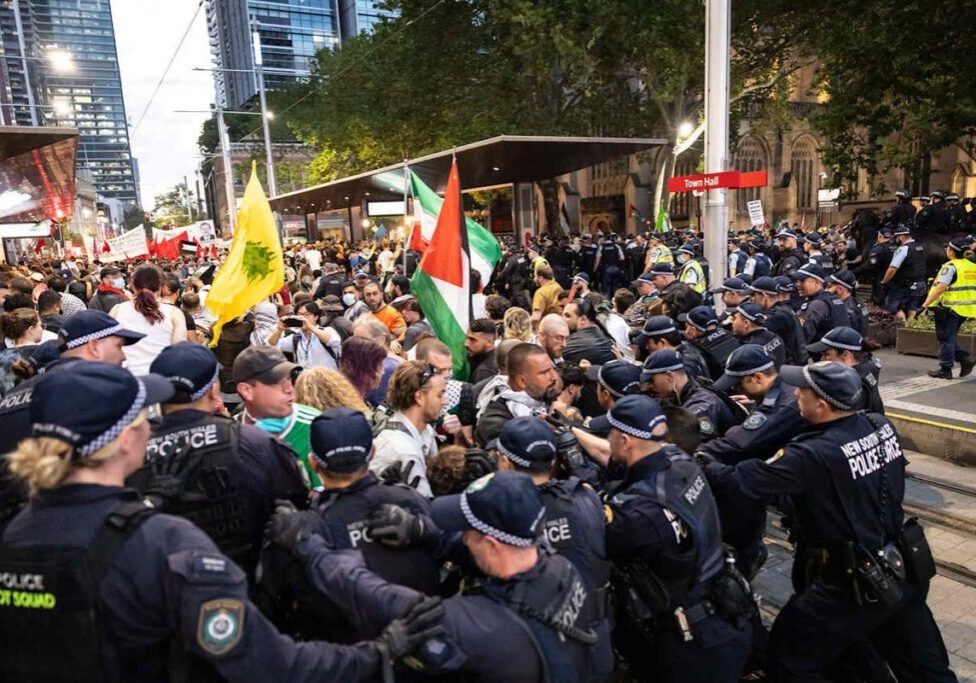Australia/Israel Review
Scribblings: The Best De-fence…
Nov 1, 2005 | Tzvi Fleischer
The Best De-fence…
On October 8, Melbourne’s Age newspaper featured a large photo of a daunting looking fence, consisting of two parallel wire barriers approximately three metres tall, each topped with razor wire, and patrolled by soldiers and military vehicles. The fence in question is full of all the latest anti-personnel technology, such as movement detectors, spotlights and infra-red cameras. When completed, it will be higher than the old Berlin wall. Moreover, the fence in question is built on disputed territory, what many would argue is “occupied land”. Finally, the fence has led to considerable violence and bloodshed. The Age reported that six people had been killed by security forces while trying to cross the fence on October 7, and others had been killed earlier in that week. Futhermore, the fence had been the site of pitched battles between locals hurling rocks and security forces responding with bayonets, shotguns and rubber bullets.
If you guessed that the barrier in question was Israel’s West Bank security fence, guess again. It surrounds the Spanish enclave of Melilla, on the Mediterranean coast of Morocco, a remnant of Spain’s colonial past. Morocco argues, with considerable regional support, that Melilla and another Spanish coastal enclave, Ceuta, are in fact occupied Moroccan territory, and must be returned.
As the Wall Street Journal—Europe pointed out in a recent editorial (Sept. 26), there are two major differences between the fence around Melilla and Israel’s security barrier. One is that no-one is protesting that this fence is illegal, a barrier to peace or a land grab, and no-one calls it an “apartheid wall”, even though its intent is very much to separate people along largely ethnic lines. In fact, the EU, which has protested so vigorously against Israel’s barrier, is actually helping Spain to fund the fence.
The other difference is the intent — the Melilla barrier is not intended to save lives or prevent terrorism. It is there to keep out largely sub-Saharan Africans looking for a better life in Europe, and who become free to move about Europe once they get into Melilla, which is a part of Spain and thus a part of the EU.
In terms of human rights and moral purposes, this fence is less justifiable than Israel’s security barrier — it has led to the deaths of more people, and is intended to prevent illegal immigration, not save lives. Yet, there are no UN meetings about it, no court cases, no protests, no claims that building it is a war crime, or that it is the equivalent of the walls around Auschwitz. The same can be said about similar fences in disputed territories, such as the ones in Kashmir, along the Saudi-Yemen border and elsewhere. One has to wonder why this might be.
Egypt also reportedly wants to take up fencing. According to the BBC (Oct. 18), Egypt has started building a 20 kilometre long fence around the resort town of Sharm el-Sheikh in Sinai. This barrier, like Israel’s, is intended to stop terrorists, such as the suicide bombers that killed 60 people in the town in July. The fence will reportedly force all persons and vehicles wanting to enter the town to pass through one of four checkpoints. It will also reportedly cut off a nearby Bedouin settlement where many workers in the town live, forcing them to travel much further to get to work and to access health care and other services. While this fence is clearly not on disputed land, we await with bated breath the protests that the humiliation of forcing people to endure checkpoints and other inconveniences will only drive Sinai residents to carry out additional terror attacks.
Ramadan Ratings Season
In the Middle East, the peak time for television viewing each year is the month of Ramadan, when, because Muslims must fast during daylight, people tend to stay inside and watch TV. And every year, the Arab media seems to wait for Ramadan to release at least one blockbuster drama series which is not merely anti-Zionist, but openly antisemitic. Two years ago, it was an Egyptian production, “Horseman without a Horse”, based on the antisemitic forgery, the Protocols of the Learned Elders of Zion. Last year, it was “The Diaspora”, a Syrian series aired on Hezbollah’s al-Manar television, which not only centred on a nefarious Jewish plot to control the world, but also revived the blood libel claim that Jews murder non-Jews to use their blood for ritual purposes. This series was later re-broadcast on Iran television, and this year is being aired by Jordanian satellite station Al-Mamnou.
This year, according to the Israeli daily Yediot Ahronot (Oct. 17), Palestinian television is supplying a new addition to the Ramadan racist television stakes with their own antisemitic series, “The Canaanite”. The story concerns a brave Palestinian secret agent, Pilpil, who joins the Palestinian police to expose a Palestinian gang which is really run by Israel in order to sell drugs to Palestinian youths. Not content with claiming Israel pushes drugs on Palestinians as part of their nefarious strategy to harm Palestinians, the series also states that Israel is infecting Palestinians with AIDS for the same purpose.
“Drugs, they are fighting us with drugs. They select strategies to fight us. Using planes at times and drugs at others,” Pilpil tells his Palestinian superior who replies, “they are even willing to use AIDS against us.”
Most of the rest of the series deals with the supposed brutality and bloodthirstiness of Israelis toward Pilpil and other Palestinians in prison. The series shows that incitement in the Palestinian media is far from a thing of the past, despite some change since the death of Yasser Arafat.
Tzvi Fleischer
Tags: Antisemitism






